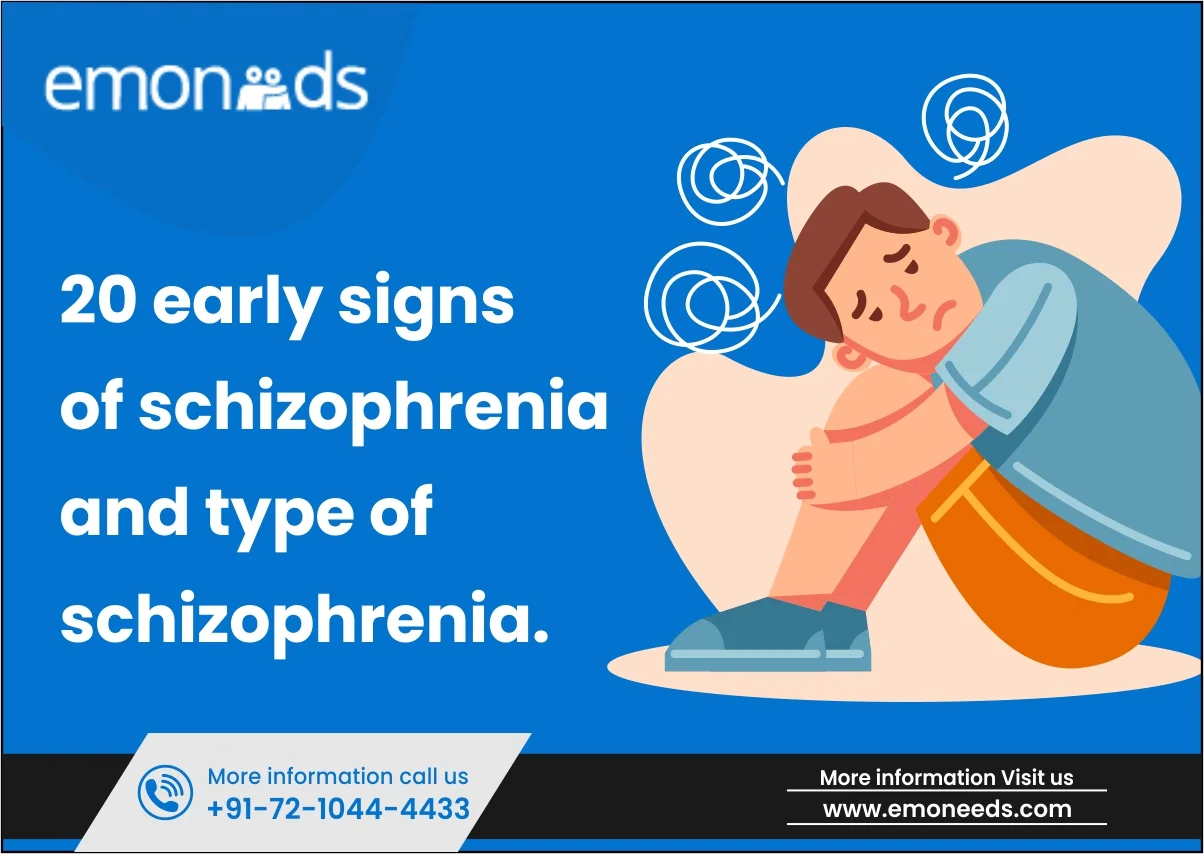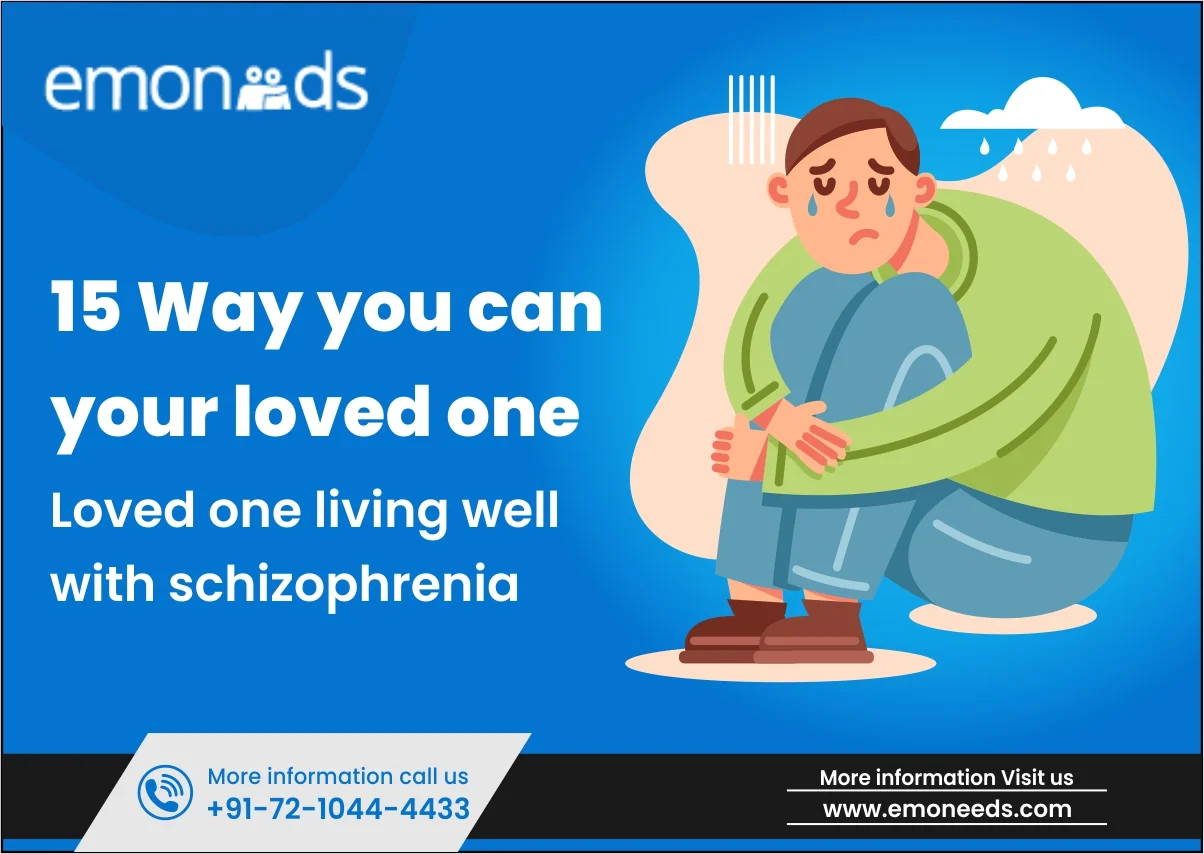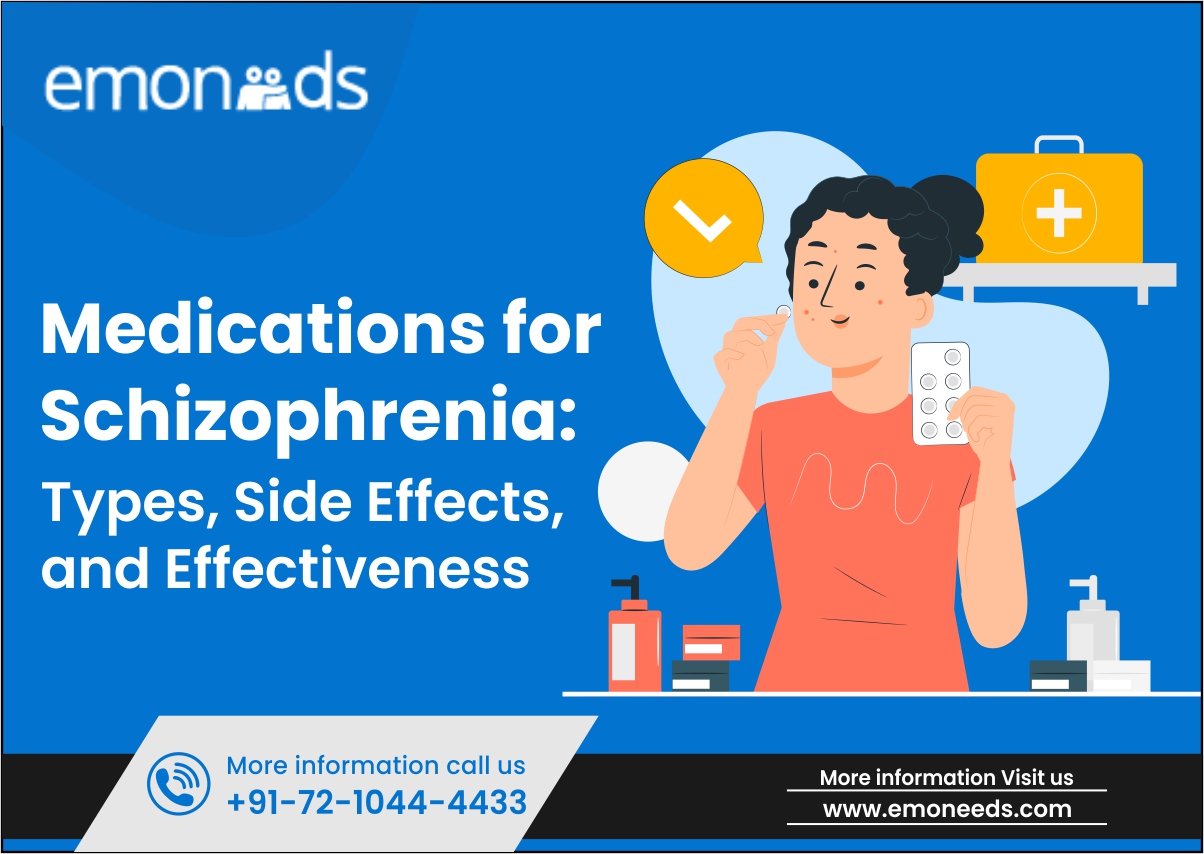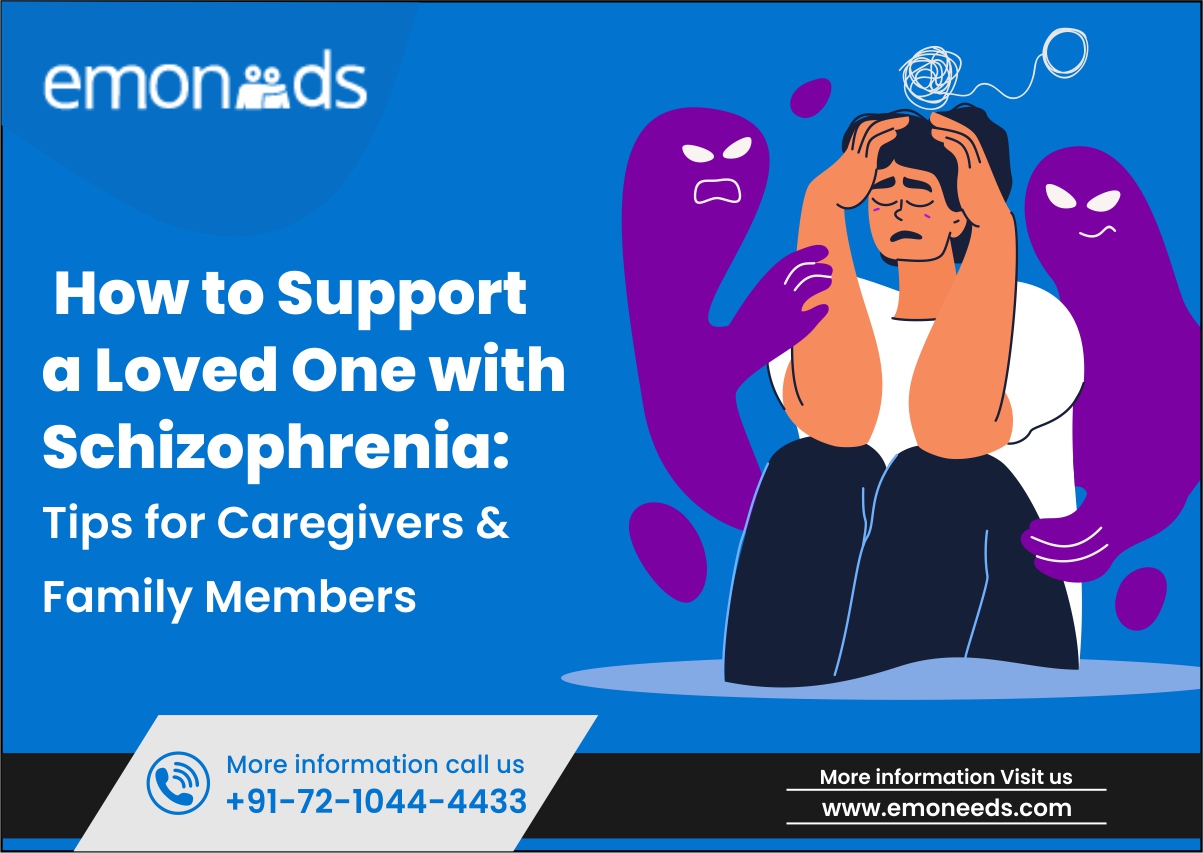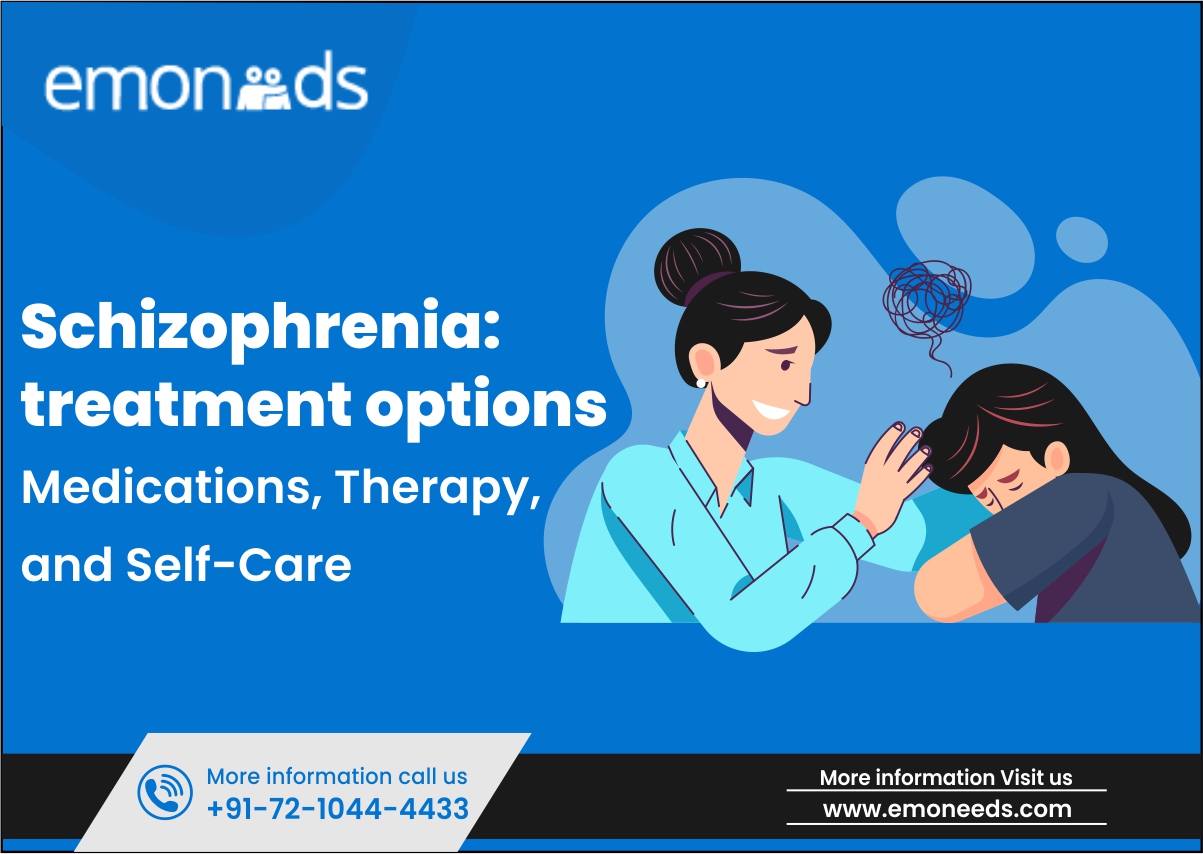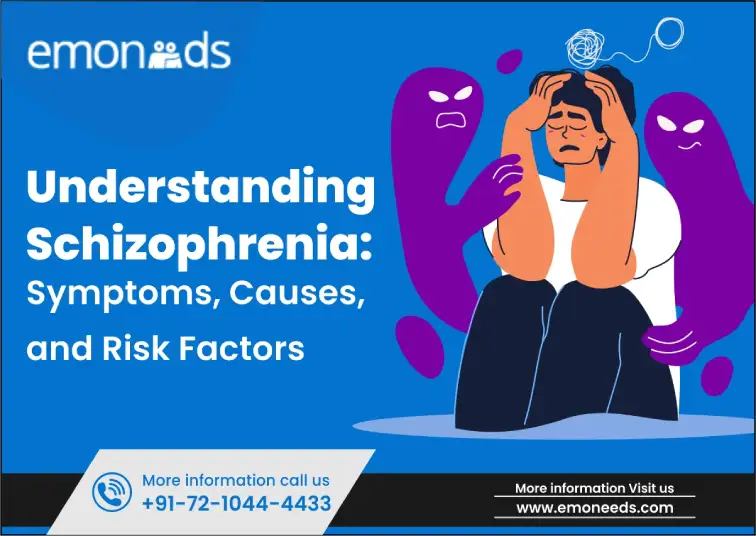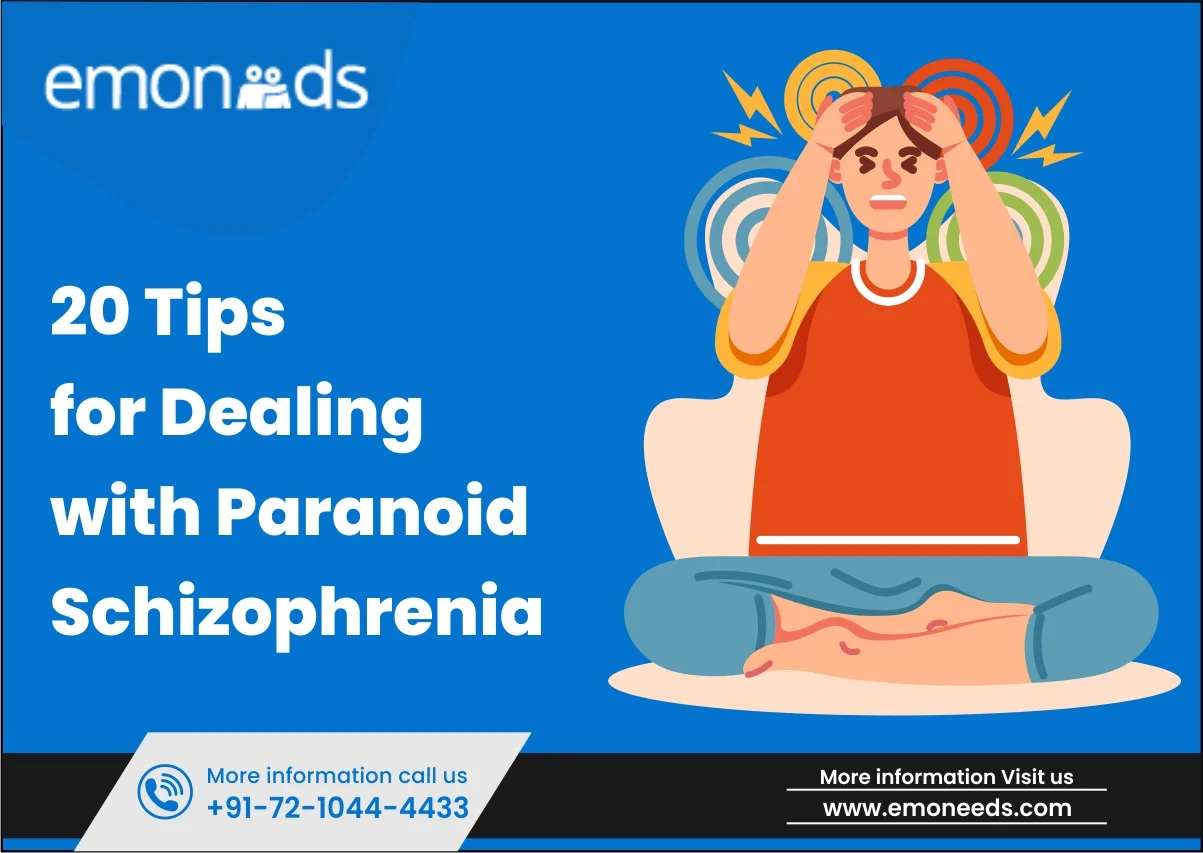
Paranoid Schizophrenia is a complex mental health condition that profoundly impacts the lives of individuals affected by it. Characterized by delusions and hallucinations, this disorder can be both distressing and isolating. However, with the right support and treatment, individuals can learn to manage their symptoms and lead fulfilling lives. Seeking professional help is crucial, and platforms like Emoneeds offer a comprehensive approach, combining therapies and medication management to aid in the recovery process.
Understanding Paranoid Schizophrenia
Paranoid Schizophrenia is a specific subtype of schizophrenia that brings forth a unique set of challenges for those affected. At its core, it is defined by intense feelings of suspicion, mistrust, and fear, which can significantly influence an individual’s perception of the world around them.
Symptoms Of Paranoid Schizophrenia
The hallmark symptoms of this condition are delusions and hallucinations:
Delusions are false beliefs that persist despite evidence to the contrary. For someone with Paranoid Schizophrenia, these beliefs are often centered around a strong sense of persecution or conspiracy, where they may genuinely believe that others are plotting against them or seeking to harm them in some way. These delusions can lead to heightened anxiety, constant vigilance, and a pervasive sense of danger, making it incredibly challenging for individuals to trust those around them, even those they once held close to.
Hallucinations, on the other hand, are sensory experiences that are not based on reality. Individuals with Paranoid Schizophrenia may experience auditory hallucinations, hearing voices that may be threatening or critical, further exacerbating their sense of paranoia and mistrust. These hallucinations can feel distressingly real, blurring the line between what is imagined and what is concrete, making it hard for the affected person to discern between the two.
Impact on Life Of Paranoid Schizophrenia
Living with Paranoid Schizophrenia can profoundly impact an individual’s daily life. Relationships, once cherished, can become strained as mistrust and suspicion create barriers to genuine connection and intimacy. The ability to concentrate and focus may be compromised due to the intrusive nature of delusions and hallucinations, affecting work or academic performance. Enjoying simple pleasures and participating in social activities may become increasingly difficult as feelings of vulnerability and threat persist.
Early Diagnosis and Treatment For Paranoid Schizophrenia
Early diagnosis and treatment are paramount for individuals with Paranoid Schizophrenia. Recognizing the signs and symptoms at an early stage can lead to timely intervention, reducing the potential for further deterioration in mental health and overall well-being. With prompt diagnosis, a comprehensive treatment plan can be developed, encompassing various therapeutic approaches, medication management, and supportive care.
Engaging in treatment offers individuals the best chance of managing their symptoms effectively and improving their quality of life. Moreover, early intervention can help prevent potential crises, hospitalizations, and the disruption of important aspects of life.
Here are 20 tips for dealing with Paranoid Schizophrenia:
1. Seek Professional Help
When facing the challenges of Paranoid Schizophrenia, seeking professional support is of utmost importance. Qualified psychiatrists and clinical psychologists possess the expertise needed to offer accurate diagnoses and craft personalized treatment plans. Notably, Emoneeds’ approach stands out with its collaborative team effort, guaranteeing comprehensive and holistic care that addresses the unique requirements of each individual. Emoneeds’ commitment to individualized treatment empowers patients on their path to recovery, providing them with the necessary tools to lead fulfilling lives despite their condition.
2. Medication Management
Medication stands as a crucial component in effectively managing the symptoms of Paranoid Schizophrenia. Antipsychotic medications, frequently prescribed, work to alleviate delusions and hallucinations, providing much-needed relief. It is vital, however, to remain aware of potential side effects that may arise from these medications. Consistency in taking prescribed medications is paramount. Skipping doses or abruptly stopping medication can lead to symptom relapse and may hinder progress. A monitored medication schedule, with regular follow-up appointments, allows healthcare professionals to assess the medication’s effectiveness.
3. Managing Medication Side Effects
For some individuals, antipsychotic medications may lead to side effects. These side effects can vary from person to person and may include drowsiness, dizziness, weight gain, or changes in blood pressure. Open communication with healthcare providers is vital in addressing any discomfort experienced. Healthcare professionals can offer valuable strategies to manage side effects effectively, ensuring patients’ well-being during treatment. In cases where side effects persist, adjustments to medication dosage or switching to an alternative medication may be considered to minimize any adverse reactions.
4. Cognitive Rehabilitation Therapy (CRT)
Cognitive Rehabilitation Therapy (CRT) stands as an effective and specialized approach to assisting individuals with Paranoid Schizophrenia. This therapeutic intervention zeroes in on enhancing cognitive functions like memory, attention, and problem-solving, which are often affected by the condition. Through various cognitive exercises and techniques, CRT helps individuals build and strengthen neural pathways, facilitating better information processing and retention. This, in turn, contributes to enhanced memory and improved attentional focus.
Emoneeds, recognizing the significance of cognitive well-being, thoughtfully incorporate CRT into their treatment plans. By harnessing the power of CRT, Emoneeds strives to empower patients with improved cognitive abilities, fostering enhanced daily functioning and facilitating a more fulfilling life journey.
5. Social Skills Therapy (SST)
Social Skills Therapy (SST) emerges as a valuable tool in aiding individuals to refine their social interactions, diminish feelings of isolation, and cultivate healthier relationships. Through SST, individuals learn essential social cues, effective listening, and assertiveness. Emoneeds recognizes the profound impact of social well-being on overall mental health and incorporates SST as a crucial component in its treatment approach.
Emoneeds’ compassionate therapists utilize specific techniques, guiding and supporting patients in developing essential social skills. Through SST, patients gain confidence in navigating social situations, communicating effectively, and forging meaningful connections, thereby enriching their lives with a renewed sense of belonging and fulfillment.
6. Daily Support and Feedback
Providing daily feedback calls to their patients is a remarkable practice that offers consistent support, enabling individuals to manage their symptoms effectively and minimize the risk of relapses. This practice involves regular check-ins, either through phone calls, texts, or in-person sessions, to ensure continuous engagement and monitoring of the individual’s well-being. It creates a nurturing and secure environment, assuring patients that they are not alone in their journey towards healing, while also providing valuable guidance during difficult moments.
Moreover, this proactive approach can reduce the severity and duration of symptom exacerbations, leading to better overall outcomes and improved quality of life. This unwavering support and care by Emoneeds become an essential lifeline for those facing the challenges of Paranoid Schizophrenia, empowering them to navigate their path to recovery with confidence and hope.
7. Creating a Supportive Environment
In the arduous journey of individuals coping with Paranoid Schizophrenia, a nurturing and understanding environment at home and work emerges as a powerful source of strength. The embrace of empathy and compassion from loved ones creates a sense of safety and acceptance, providing a much-needed anchor in times of turbulence.
Moreover, involving family and friends in the recovery process establishes a strong network of care that transcends the boundaries of the condition. Shared support and understanding foster a culture of healing and genuine connection. The encouragement and involvement of loved ones become a vital aspect of the recovery journey, illuminating a path of hope and progress for those grappling with Paranoid Schizophrenia.
8. Managing Stress and Anxiety
Stress and anxiety can significantly intensify symptoms of Paranoid Schizophrenia, making it crucial to address these factors for overall well-being. Incorporating relaxation techniques and stress management strategies into daily routines can offer considerable relief. Mindfulness practices, in particular, can cultivate a heightened awareness of the present moment, helping individuals detach from distressing thoughts and reduce reactivity. By proactively managing stress and anxiety, individuals can enhance their ability to navigate difficult situations and experience greater emotional resilience.
9. Setting Realistic Goals
In the journey towards managing Paranoid Schizophrenia, setting achievable goals acts as stepping stones, allowing individuals to make meaningful progress, no matter how small. The role of therapists in this process is instrumental, as they skillfully guide individuals in setting realistic and attainable objectives. Through compassionate support and expertise, therapists help break down larger goals into manageable steps, making the journey toward progress more feasible and rewarding. Through ongoing progress monitoring, individuals can stay on track and work towards greater fulfillment and improved mental well-being.
10. Physical Exercise
Engaging in physical activities promotes a profound sense of well-being, as it triggers the release of endorphins, the “feel-good” hormones that uplift mood and reduce stress. Regular exercise is also linked to lower levels of anxiety and depression, as it helps to regulate the body’s stress response. Moreover, physical activity supports improved sleep quality, which is crucial for mental well-being. Incorporating exercise into daily routines, whether it’s a brisk walk, a yoga session, or a workout at the gym, contributes to better overall mental and physical health.
11. Balanced Nutrition
The correlation between diet and mental health is undeniable. Adopting a balanced diet, rich in essential nutrients, can significantly impact brain health and aid in managing symptoms of Paranoid Schizophrenia. Nutrient-dense foods, such as fruits, vegetables, whole grains, lean proteins, and healthy fats, play a vital role in nourishing the brain and promoting overall well-being. Omega-3 fatty acids, found in fatty fish and certain seeds, have been linked to improved cognitive function and mood regulation.
Additionally, antioxidants from colorful fruits and vegetables can help combat oxidative stress, supporting brain health. Moderating caffeine and sugary foods may also contribute to emotional stability.
12. Sleep Hygiene
Quality sleep plays a pivotal role in promoting emotional well-being and cognitive function. To achieve better sleep, establishing a consistent sleep routine is key. Try going to bed and waking up at the same time each day, even on weekends. Creating a comfortable sleep environment is equally vital. Ensure your bedroom is cool, dark, and free from distractions. Avoid stimulating activities or screens before bedtime and instead, opt for relaxing rituals like reading or meditation. By prioritizing sleep hygiene, individuals can experience improved sleep quality, enhanced mental clarity, and a more positive outlook on life.
13. Encouraging Hobbies and Interests
Embracing hobbies and interests go beyond mere pastimes; it offers a powerful therapeutic outlet for emotions and nurtures a profound sense of joy and accomplishment. For individuals grappling with the challenges of Paranoid Schizophrenia, creative pursuits can become a refuge, providing a means to express complex emotions that may be difficult to articulate verbally. Whether it’s painting, writing, gardening, or playing a musical instrument, engaging in creative outlets allows emotions to be channeled constructively, fostering a profound sense of catharsis and self-discovery.
Emoneeds recognizes the transformative impact of these pursuits and actively encourages individuals to explore and embrace their creative sides. By doing so, they empower their patients to discover newfound strength, resilience, and a deeper connection with their inner selves, embarking on a journey of healing and self-expression.
14. Addressing Co-occurring Disorders
In managing Paranoid Schizophrenia, it is crucial to recognize the potential presence of co-occurring disorders that might accompany the condition, such as anxiety and depression. These additional mental health challenges can have a significant impact on an individual’s overall well-being and treatment outcomes.
Addressing co-occurring disorders requires a comprehensive approach that involves thorough evaluation and assessment. By identifying and understanding the unique needs of each individual, tailored treatment plans can be devised to provide holistic care and support. Addressing these co-existing conditions alongside Paranoid Schizophrenia helps ensure a comprehensive and integrated approach to mental health, ultimately empowering individuals to pursue a path of recovery.
15. Monitoring Progress
The significance of monitoring progress cannot be overstated in managing Paranoid Schizophrenia effectively. Regularly assessing the outcomes of treatment allows healthcare professionals to make informed decisions and tailor treatment plans accordingly. It enables them to identify what approaches are working well and what adjustments might be necessary to achieve better results. Equally important is the involvement of individuals in their own treatment decisions.
Empowering patients to actively participate in their recovery journey fosters a sense of ownership and control over their well-being. By engaging patients in treatment decisions, healthcare providers acknowledge their unique experiences and perspectives, cultivating a patient-centered approach to care. This partnership enhances treatment outcomes and empowers individuals to make meaningful progress toward a fulfilling and balanced life.
16. Crisis Management Plan
Developing a crisis management plan is a vital step in preparing for challenging times. Such a plan provides clear guidelines and coping strategies to navigate crises effectively. It should include important emergency contact information, such as contacts for healthcare providers, therapists, and support networks. Personalized crisis interventions ensure a proactive approach to managing difficult situations.
By having a well-thought-out crisis management plan in place, individuals with Paranoid Schizophrenia and their support networks can act swiftly and decisively during times of distress, promoting safety, stability, and the best possible outcomes in the face of adversity.
17. Psychoeducation
In the journey of managing Paranoid Schizophrenia, equipping individuals with essential knowledge about their condition is paramount. Providing coping strategies and problem-solving skills empowers them to navigate the challenges with greater resilience. Emoneeds stands out for its evidence-based psychoeducation programs, offering a wealth of information and insights to enhance understanding of the disorder.
By imparting valuable knowledge, these programs empower individuals with the tools they need to take an active role in their treatment and recovery. Educating individuals about Paranoid Schizophrenia fosters a sense of self-empowerment, enabling them to heal and grow with confidence.
18. Celebrating Successes
Amidst the challenges of managing Paranoid Schizophrenia, recognizing and celebrating every achievement holds great significance. Emoneeds emphasizes the importance of acknowledging progress and taking pride in one’s efforts. Each step forward, no matter how modest, represents a triumph in the recovery journey.
Celebrating successes not only boosts self-esteem but also reinforces a positive mindset, inspiring individuals to continue their pursuit of wellness with renewed determination. Embracing these moments of achievement cultivates a sense of gratitude and hope, reminding individuals that they possess the strength to overcome obstacles, making their journey toward recovery an empowering and transformative experience.
19. Art and Music Therapy
Art and music therapy serve as powerful mediums for emotional expression and stress relief. These therapeutic approaches provide creative outlets for individuals to channel their emotions, explore their inner selves, and find solace in self-expression. Emoneeds recognizes the profound therapeutic benefits of art and music and thoughtfully integrates these modalities into their treatment approach to promote emotional well-being.
Engaging in artistic endeavors and musical pursuits empowers individuals to tap into their emotions in a nonverbal and liberating manner, allowing them to process their feelings and experiences more profoundly.
20. Avoiding Substance Use
For individuals with Paranoid Schizophrenia, substance use poses significant risks to their well-being and recovery. Substance abuse can exacerbate symptoms, making it challenging to manage the condition effectively. Additionally, drugs and alcohol can interfere with prescribed medications, reducing their efficacy and potentially leading to harmful interactions.
Emoneeds places great emphasis on the importance of avoiding substances that may hinder the recovery process. By steering clear of such substances, individuals can safeguard their mental health, optimize the benefits of treatment, and enhance their chances of achieving a stable and fulfilling life.
Conclusion
Coping with Paranoid Schizophrenia is undoubtedly challenging, but with the right tools and support, individuals can lead fulfilling lives. Seeking professional help, such as that offered by Emoneeds, is crucial for creating personalized treatment plans that encompass medication management, various therapies, and holistic care. By implementing the 20 tips discussed in this blog and embracing the journey toward recovery, individuals with Paranoid Schizophrenia can find hope and a renewed sense of purpose in their lives. Remember, recovery is possible, and support is available every step of the way.





